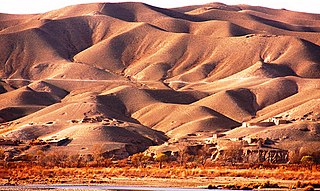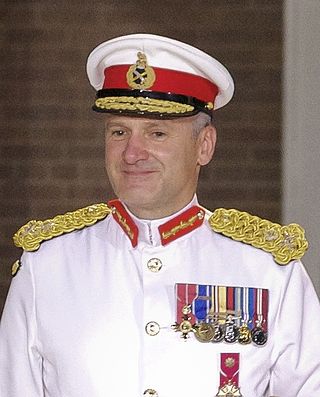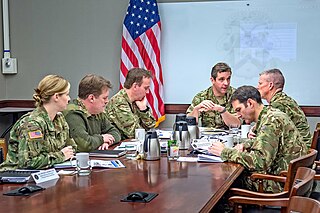Related Research Articles

Helmand, also known as Hillmand, in ancient times, as Hermand and Hethumand, is one of the 34 provinces of Afghanistan, in the south of the country. It is the largest province by area, covering 58,584 square kilometres (20,000 sq mi) area. The province contains 18 districts, encompassing over 1,000 villages, and roughly 1,446,230 settled people. Lashkargah serves as the provincial capital. Helmand was part of the Greater Kandahar region until made into a separate province by the Afghan government in the 20th century.
The Household Cavalry Regiment (HCR) is an Armoured Cavalry regiment of the British Army based in Bulford Camp in Wiltshire. It is the brother regiment of the Household Cavalry Mounted Regiment (HCMR) based at Hyde Park Barracks in London - both regiments together form the Household Cavalry (HCav). The Household Cavalry Regiment was formed in 1992, under the Options for Change reforms, by the union of The Life Guards and The Blues and Royals in order to preserve the distinct identities of the regiments. A precedent for the Household Cavalry Regiment has previously been set by the Household Cavalry Composite Regiment - active during the Anglo-Egyptian War, the Second Boer War and latterly during both the First and Second World Wars.
The Advanced Research and Assessment Group (ARAG) was a department of the Defence Academy of the United Kingdom concerned with long-term planning and threat assessment.

Marshal of the Royal Air Force Graham Eric Stirrup, Baron Stirrup,, informally known as Jock Stirrup, is a former senior Royal Air Force commander who was the Chief of the Defence Staff from 2006 until his retirement in late 2010. He is now a Crossbench member of the House of Lords. In April 2013, he was appointed a Knight Companion of the Order of the Garter by Queen Elizabeth II.
Sher Mohammed Akhundzada is an Alizai tribal leader who was the Governor of Helmand in Afghanistan from 2001 to 2005. As governor, he implemented various agricultural projects in Helmand, including canal excavation from the Kajaki dam for irrigation and electricity generation projects. He was deeply involved in opium production and smuggling, leading to his removal from office by the Afghan government in 2005 after lobbying by the British, who were leading counter-narcotic efforts in Afghanistan at the time. He was succeeded as governor of Helmand by Mohammad Daoud.
Operation Mountain Thrust was a joint NATO and Afghan-led military operation in the War in Afghanistan. It involved more than 3,300 British troops, 2,300 U.S. troops, 2,200 Canadian troops, along with approximately 3,500 Afghan soldiers, supported by extensive air power. Its primary objective was to quell the ongoing Taliban insurgency in the south of the country.

Musa Qala is a district in the north of Helmand Province, Afghanistan. Its population was around 57,500 in 2012 and are 97% ethnic Pashtun. The district centre is the village of Musa Qala; there are 19 other large villages and 200 smaller settlements, mostly along the Musa Qala River. The area is irrigated by the Helmand and Arghandab Valley Authority.
The 52nd Infantry Brigade was a formation of the British Army, which was first formed in 1914 as part of Kitchener's Army. The brigade was disbanded in 1919, but reformed in British India during the Second World War and disbanded in 1945. It was again formed in 1982, and existed until 2010.

Operation Herrick was the codename under which all British operations in the War in Afghanistan were conducted from 2002 to the end of combat operations in 2014. It consisted of the British contribution to the NATO-led International Security Assistance Force (ISAF), and support to the American-led Operation Enduring Freedom (OEF), within the South Asian country.

Musa Qala is a town and the district centre of Musa Qala District in Helmand Province, Afghanistan. It is located at 32.4433°N 64.7444°E and at an altitude of 1,043 m in the valley of Musa Qala River in the central western part of the district. Its population has been reported in the British press to be both 2,000 and 20,000. It is in a desolate area, populated by native Pashtun tribes.

General Sir Nicholas Ralph Parker, is a former British Army officer who served as Commander Land Forces until December 2012.

The Helmand province campaign was a series of military operations conducted by the International Security Assistance Force (ISAF) forces against Taliban insurgents and other local groups in the Helmand Province of Afghanistan. Their objective was to control a province that was known to be a Taliban stronghold, and a center of opium production. None of the ISAF's intended strategic and political objectives were achieved in the long term.
The Battle of Musa Qala was a British-led military action in Helmand Province, southern Afghanistan, launched by the Afghan National Army and the International Security Assistance Force (ISAF) against the Taliban on 7 December 2007. After three days of intense fighting, the Taliban retreated into the mountains on 10 December. Musa Qala was officially reported captured on 12 December, with Afghan Army troops pushing into the town centre.

US and NATO International Security Assistance Force (ISAF) operations, alongside Afghan National Army forces, continued against the Taliban through 2007.
Mullah Abdul Salaam Alizai is a former member of the Taliban movement who defected to the Afghan government in December 2007. He is a leader of the Alizai, a Pashtun tribe.

The siege of Musa Qala took place between July 17 and September 12, 2006 in Afghanistan's Helmand province. A small force of International Security Assistance Force (ISAF) troops and Afghan security forces were besieged by Taliban insurgents inside the district centre of Musa Qala.
Task Force Helmand was the name given to a military unit of the International Security Assistance Force in Helmand Province, Afghanistan. Task Force Helmand was part of Regional Command Southwest and consisted primarily of personnel from the British Armed Forces, as well as contribution from NATO allies Denmark and Estonia. It was established in April 2006, which coincided with the deployment of Operation Herrick 4.

Lieutenant General Edward Grant Martin Davis, is a former senior Royal Marines officer. He was Commandant General Royal Marines from December 2011 to June 2014, and the Deputy Commander of NATO's Allied Land Command in Izmir, Turkey, from 2014 to 2015. He was Governor of Gibraltar from 2016 to 2020.

Major General Christopher James Bell, is a former British Army officer. Bell served in both the Iraq War and the War in Afghanistan.

Major General Gerald Mark Strickland, is a senior British Army officer.
References
- ↑ "No. 58776". The London Gazette (Supplement). 25 July 2008. p. 11241.
- ↑ "No. 54028". The London Gazette (Supplement). 5 May 1995. p. 6611.
- ↑ "No. 58183". The London Gazette (Supplement). 15 December 2006. p. 17361.
- 1 2 3 4 "Major-General Andrew Mackay: profile". The Telegraph. 25 September 2009.
- ↑ "Petraeus: it's the human terrain that wins the war". The Scotsman. 22 August 2009.
- ↑ "Afghanistan general quits over disillusionment with government strategy". The Telegraph. 25 September 2009.
- ↑ Farrell, Theo (2010). "Improving in War: Military Adaptation and the British in Helmand Province, Afghanistan, 2006–2009". Journal of Strategic Studies. 33 (4): 567–594. doi:10.1080/01402390.2010.489712. S2CID 154939715.
- ↑ COIN Machine: The British Military in Afghanistan
- ↑ The Battle for Helmund
- ↑ Afghanistan (BBC)
- ↑ ROSE, P. Dr., "Delivering Strategic Communications and Influence in Afghanistan: A UK Perspective", Defence Policy Analysis Group, Defence Science and Technology Laboratory, 24/10/2010
- ↑ Army Commands Archived 5 July 2015 at the Wayback Machine
- 1 2 3 "MoD 'institutionally incapable' of succeeding in Afghanistan". The Telegraph.
- ↑ Behavioural Conflict: Why Understanding People and Their Motives Will Prove Decisive in Future Conflict Military Studies Press, ISBN 978-1780394688
- ↑ "Afghanistan: The Lessons of War". BBC. Retrieved 24 November 2014.
- ↑ "The Art of Influence". BBC. Retrieved 15 September 2015.
- ↑ Complexas Ltd
- ↑ Instability, Profitability, and Behavioural Change in Complex Environments